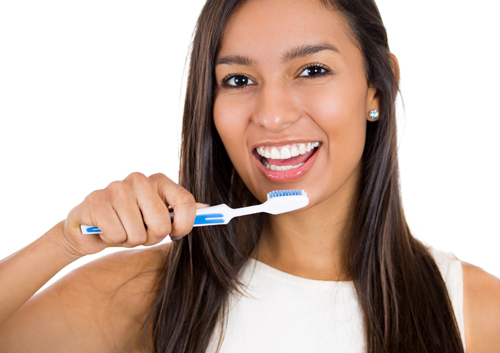How does a tooth decay?
March 5th, 2026

When acids are allowed to erode tooth enamel long enough to leach calcium and other minerals from your enamel and dentin, a process called demineralization occurs. This rapidly leads to tooth decay unless reversed by good oral hygiene and professional dental cleanings at our Anthem office. Acids responsible for tooth decay come from the wastes of mutans streptococci and lactobacilli bacteria that thrive in dental plaque, a substance that is the leading cause of periodontitis.
Where do demineralizing acids come from?
Dietary sugars comprise the bulk of tooth-decaying acids, including table sugar, cooked starches, fructose, glucose, and lactose. In fact, as soon as you bite down on a sugary cookie or into a French fry, bacteria start digesting sugars, breaking them down and eventually excreting them as demineralizing acids. As this bacteria colony grows and becomes organized, plaque develops and forms that tough, yellowish coating you often see on the tops of teeth at the gumline.
Plaque is the Problem
Dental plaque is a filmy type of nesting place for bacteria that also keeps acids pressed against tooth enamel. Since plaque cannot be removed by brushing, it is important that a person who suffers tooth decay visit Daisy Mountain Dentistry immediately so we can use special tools to scrape and thoroughly clean teeth.
Signs of Tooth Decay
Early tooth decay and cavities remain asymptomatic until demineralization creates a hole deep enough to reach the tooth’s inner tissues and nerve endings. Eventually, tooth decay will cause tooth sensitivity, toothache, vague pain when biting down on the affected tooth, and possibly pus seeping around a tooth’s gum line if the decay creates an infection. If treatment is delayed long enough, a decaying tooth may loosen, crumble, and ultimately fall out, which leaves an empty or partially empty socket.
Preventing Tooth Decay
Getting regular checkups with Drs. Peter Vogel, Vijal Vadecha, brushing and flossing twice a day, and eating fruits or crunchy vegetables at snack time instead of a candy bar or doughnut are the three best ways to keep your teeth healthy, white, and where they should be: in your mouth.
Heading Off to College? Maybe It’s Time to Graduate to an Electric Toothbrush!
February 26th, 2026

Your trusty manual toothbrush has been with you from pre-school through high school—well, obviously not the same manual toothbrush, because that would be seriously unhygienic—but it’s the kind of toothbrush you’re used to and comfortable with.
Now, though, you’re off to college, and your lifestyle will be changing. Late night study sessions complete with study session snacks. Getting caught up in a project and making dinner from dorm vending machines. Grabbing fast food on the way to the practice field, or work-study job, or evening class. You get the point—meals can be hectic, unscheduled, and less than tooth friendly.
Maybe it’s time to consider an electric toothbrush. After all, anything that can make your life easier and more efficient during busy college days deserves a spot in your dorm room.
- Electric Brushes Are Effective
The most important reason to switch to an electric toothbrush is its effectiveness. Several studies have shown that regular use of an electric toothbrush leads to a marked reduction in plaque, that bacteria-filled film which sticks to the teeth and leads to cavities and gingivitis. And it’s really no surprise that an electric brush can out-perform a manual brush.
Electric toothbrushes offer several design options, from oscillating/rotating brushes to oscillating/rotating/pulsating models to brushes using sonic vibration technology. What these technologies all have in common is the ability to remove plaque far more efficiently than we can on our own, because electric brushes provide the equivalent of thousands and even tens of thousands of brushstrokes per minute, compared to the hundreds we can achieve by hand.
You know by now what your brushing habits are like. If you tend to be a bit cavalier with your brushing and flossing, make sure you set yourself up for success. Because you have better things to do during semester breaks and summer vacations than visiting Drs. Peter Vogel, Vijal Vadecha!
- Electric Brushes Can Make Life Easier
Several of today’s electric brushes come with options designed to do more than simply remove plaque. They can let you know if you’ve brushed for the recommended two minutes, alert you if you’re brushing too hard, and even remind you when it’s time to replace the brush head.
Want more from your electric brush? Some models offer apps that can map out just where you’ve brushed, in case there are a few spots that often get overlooked. Or provide different brushing modes for daily cleaning, deep cleaning, whitening, and more. Or come with a travel case that can recharge while you’re busy exploring the world—or going home for a visit.
In the end, it’s up to you. Do some independent study and research the toothbrushes that will give you the best results for your individual brushing habits. You might not need or want a brush with all the technological bells and whistles.
If you’re comfortable with your manual brush and you get good grades when you visit our Anthem office, stick with it. But if you think you might benefit from the ease and efficiency of an electric toothbrush, if an electric toothbrush makes your teeth and gums healthier and your smile brighter, that’s an extra credit project worth pursuing.
Three Signs You May Have Gingivitis
February 19th, 2026

Gingivitis, or inflammation of the gums, is an early stage of gum disease. If you have gingivitis, it’s important to visit Drs. Peter Vogel, Vijal Vadecha to get proper treatment, since home care isn’t enough to get rid of the plaque that leads to tartar and eventually to gum disease. Monitor yourself to see if you have these signs of gingivitis, and get help as soon as you can to prevent the progression to periodontitis. Your vigilance could save your teeth.
1. You have one or more risk factors.
Having risk factors for gingivitis doesn’t mean that you have or will get the disease, but it does mean that you should be especially watchful. You’re more likely to get gum disease if you have the following risk factors:
- You are a smoker.
- You are a female going through puberty, pregnancy, or menopause.
- You have diabetes.
- You have a compromised immune system, as is the case if you have HIV/AIDS.
- You have a family history of gum disease.
2. You have inflammation in your gums.
Gingivitis is inflammation of the gums, and that is a tell-tale sign of the condition. Gingivitis or periodontitis can involve a bacterial infection, and inflammation is your body’s response to an injury or infection. The four standard signs of inflammation are pain, redness, swelling, and a higher temperature than normal.
If you have inflammation around your teeth, your gum disease may have progressed to the more serious condition of periodontitis. Drs. Peter Vogel, Vijal Vadecha can evaluate your case using a scope, or small ruler. The ruler is used to measure the pockets around your teeth, with a depth of one to three millimeters being normal.
3. Your teeth seem to be moving around.
Loose teeth are a classic sign of periodontitis. You may also have them if you have gingivitis. They can occur when your gum line recedes, or as the result of having soft bone in your jaw.
You might also notice other signs of your teeth moving around. For example, they may seem to be oddly spaced, or they could be separating from each other. You might also notice that your partial dentures don’t fit properly anymore, even if they’re not that old.
Gingivitis is a very treatable condition, but you need the help of Drs. Peter Vogel, Vijal Vadecha to keep it in check. Contact our Anthem office to schedule an exam today!
How do I pick the right toothpaste for my needs?
February 12th, 2026

With so many toothpastes available in so many price ranges, it can be difficult to be sure you are selecting the right one for your needs. You need a product that not only protects against tooth decay, but also addresses any special concerns that Drs. Peter Vogel, Vijal Vadecha and our team have raised. Look for the American Dental Association seal and do some research to find the toothpaste that best meets your needs.
Choose a Product Approved by the American Dental Association
The American Dental Association approves dental products such as toothbrushes, dentures, mouthwashes, dental floss, and toothpastes when they meet certain quality standards. Before products can display the seal, the American Dental Association must verify that the product does what it claims to do. Look for the American Dental Association seal on the toothpaste package before you buy it. Also, check to make sure that the toothpaste contains fluoride, which helps protect against decay.
Consider Special Needs
You may be depending on your toothpaste to perform extra tasks beyond cleaning your teeth. These are some common concerns that the right toothpaste can address.
- Bad breath (halitosis)
- Sensitive teeth
- Plaque or gingivitis
- Tartar
- Yellowing teeth
The American Dental Association’s website has a tool that lets users input their requirements and view a list of the toothpastes that carry the American Dental Association’s seal and address those particular oral health needs.
Make Your Children’s Tooth-Brushing Experience Fun
If you select toothpaste that contains fluoride and has the American Dental Association seal, most types of toothpaste will be fine for your children as long as they have no special needs. Allowing your kids to select fun toothpaste can encourage them to enjoy the brushing experience more, so that they brush more frequently and do a better job.
The following toothpaste characteristics can make brushing more fun for children.
- Fun flavors, such as bubble gum, berry, and watermelon
- Sparkles and swirls that make the toothpaste appear more attractive
- Toothpaste that comes in a pump
- Toothpaste with a container decorated with superheroes


